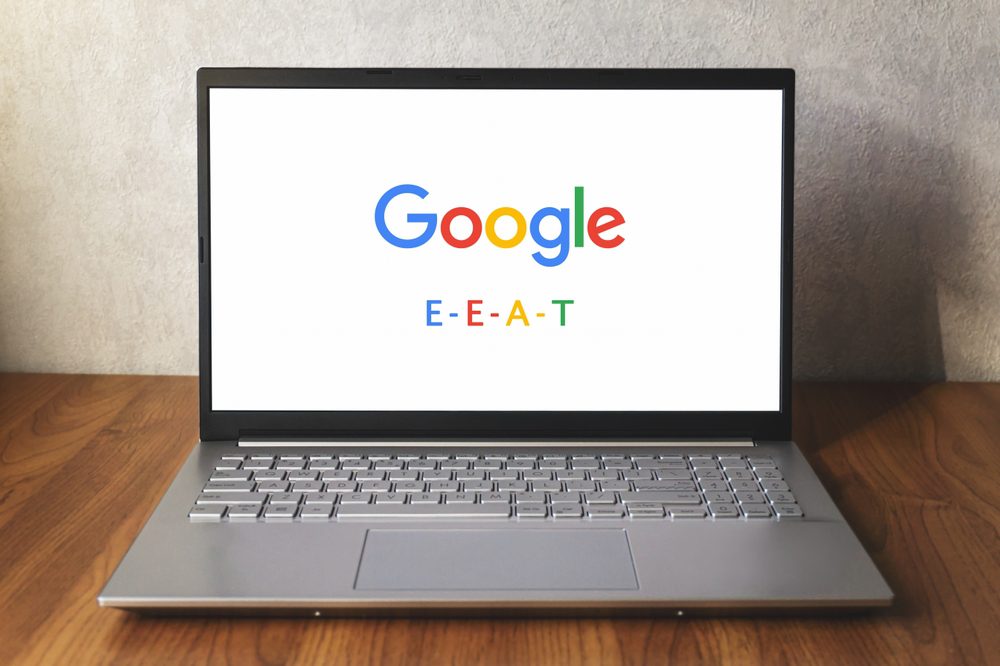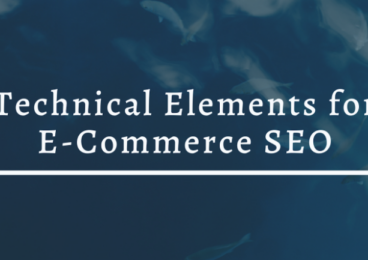 Reading Time: 7 minutes
Reading Time: 7 minutesEEAT is an acronym for Experience, Expertise, Authoritativeness, and Trustworthiness. It is a framework used by Google to assess the quality of content on a website.
E-E-A-T helps Google determine which websites should be ranked higher in the SERPs based on their credibility and value that it provides to users. When the content on your site is helpful for the reader and uses multiple EEAT factors, it can perform better in the SERPs.
But the challenge is, EEAT can be a difficult concept to apply practically to blogs. In this blog, we breakdown what E-E-A-T stands for, and how you can incorporate more of it on you own website.
Understanding E-E-A-T and Page Quality Rating in SEO
Page Quality rating is a metric used by Google to assess how well a web page achieves its intended purpose. Experience, Expertise, Authoritativeness, and Trust are important in PQ (Page Quality) Rating, and translate to better SEO.
Here’s a breakdown of E-E-A-T:
- Experience: This assesses whether an author only has theoretical knowledge on a subject as opposed to having a practical lay of the field. The idea is that an experienced author would have more original insight and can offer more practical advice.
For instance, when writing a product review, experience is important to know whether an author has actually used the product or is simply using information from other blogs to write his article.
- Expertise: This refers to the first-hand knowledge and background of the author about that type of content they’re writing about. The idea is that the more qualified an author is about a topic, the more the content is reliable and accurate.
For example, tax content written by accountants and tax agents shows more expertise. Similarly, medical content written or reviewed by doctors is likely to be seen as having
- Authoritativeness: An authoritative website is one that has expansive information on a subject, and can become the go-to source for people looking for a definite search topic. Google can also assess the credibility of the website and the author to assess authoritativeness.
- Trust: Possibly the most important of all factors is trust. It sort of uses all other EEAT principles to judge how trustworthy a website is overall. It also looks at factors like how secure a website is to interact with and transact on. Without trust, a website is likely to have very low EEAT.
How E-E-A-T Differs from E-A-T
E-A-T was originally introduced in Google’s Search Quality Rater Guidelines in 2014. But in December 2022, Google added another concept to this framework: Experience.
E-A-T’s purpose was to help human evaluators assess the credibility of websites and the information they presented. This helped users find more reliable sources of information, particularly for topics that could impact their “Your Money or Your Life” (YMYL). This includes content in the medical, tax, and finance fields.
However, Google identified some limitations with E-A-T. Its principles were prone to being gamed by websites with theoretical knowledge that lacked actual practical experience. So on paper, it sounded like the author had real-life experience, but he/she didn’t necessarily have any original or practical insight to offer.
Consequently, Google introduced the extra “E” for Experience.
E-E-A-T ensures content comes from creators who not only possess the knowledge, but have also applied it in the real world. Google says this change allows them to “better assess the results and rank content with a foundation of solid expertise.”
Does E-E-A-T Apply To All Types Of Content?
While EEAT applies to all web content, for YMYL content, Google has different standards for EEAT.
Given the potential consequences of inaccurate or unreliable information in medical, finance, or accounting field — EEAT is even more important for these websites. This is why Google ensures that YMYL content comes from highly credible, original, and authoritative sources.
So, it’s likely that YMYL websites that don’t create content that follows the EEAT framework are more likely to see poor SEO performance than others.
Other Niches Most Affected by E-E-A-T
According to this Quality Rater Guidelines pdf published by Google, websites in the following niches are most likely to be affected:
- Health or Medical Websites: In 2018, Google released a broad core update known as the Medic Update. This update, which also relied on E-E-A-T factors, drastically affected some websites that publish health-related content, such as doctors, dentists, hospitals, healthcare professionals and other sites providing medical and health information.
During this period, websites that fell short in terms of user-friendly design and topical authority fell out of the SERPs. Alternatively, websites with robust E-A-T content saw an improvement in their search engine rankings and visibility.
As healthcare websites continue to fall under the YMYL category and EAT also makes a big chunk of what EEAT represents—medical websites need to prioritize EEAT to see good SEO performance.
- E-Commerce Websites: Since there are ecommerce websites that operate dishonestly, like taking payments without fulfilling orders, and then disappearing, search engines mainly look for trustworthiness of ecommerce websites.
Ecommerce sites need to differentiate themselves from the competition. What are the unique business offerings and why should customers purchase from this store rather than a competitor. Perhaps there’s an exclusive product line, or a unique shopping experience. Other signals that help users and demonstrate trustworthiness are to include offering secure transactions, state clear return, shipping, privacy policies, and provide positive user interactions.
Note: Since “author bios” are less relevant to assess the credibility of e-commerce product pages, the sitewide trustworthiness is more important for E-E-A-T.
- News Websites: Google has taken proactive measures against the spread of misinformation and fake news. This is why, trustworthiness is important for news websites.
If Google detects that a website is spreading false information, it may lower the ranks of such news websites in search results and Google Discover page to reduce the number of people who could be exposed to the misinformation.
How to Boost Your Website’s E-E-A-T?
Since the EEAT framework is how the Google raters evaluate websites and how they match up to a query, we’re going to provide some tips on what you can do to improve the quality of the content on your website for users, Google raters, and the Google algorithms:
1. Include the Author’s Bio
Author bios are a good way to establish credibility of the information as you can list the author’s professional qualifications and experience on the subject.
Every author needs to have their own dedicated author’s page containing a brief biography highlighting their relevant qualifications, experience, and expertise. Include a professional picture along with links to their social media profiles, appearances, awards, qualifications, and other newsworthy highlights.
You want to build them up to be the expert for your company and authority in the industry.
Note: To make the author more likely to be picked up by Google’s knowledge graph, use the Person Schema on each of your author pages. The key elements involved in this schema include education history (alumniOf), skills and expertise (knowsAbout), credentials (hasCredential), and honorific prefixes such as “Dr.” (honorificPrefix).
2. Focus on Quality of Content
Google prefers original and good content that provides accurate information written by experts in the field. This means that quality of content is invariably tied to EEAT.
But what guidelines can you follow to create and assess high quality content?
Google’s advice to website owners regarding Google helpful content updates applies here.
Since the first October 2022 helpful content update, Google has looked for content that’s original, interesting, and helpful. March 2024 core update also strengthened how the systems detect “unhelpfulness” of content. As a result, many websites that abuse mass-produced content were hit.
The advice for both is the same: create people-first content.
But what does that mean? According to Google, “content where visitors feel they’ve had a satisfying experience, while content that doesn’t meet a visitor’s expectations won’t perform as well.”
On their page, Google also offers some advice on how to assess the quality of your content.
Here are some other ways you can make your content more E-E-A-T friendly:
- Authors should stick to their areas of expertise to establish authority. For example, an author specializing in IRS tax brackets should not write about the best stocks to invest in.
- If a post has been written by one person and subsequently edited by another, it should include the names of both authors.
- Cite facts and back up claims with research. Provide your own analysis, data, charts, maps or illustrations. Link to reputable sources whenever possible to show how you gathered information.
- Provide internal links only to relevant pages that resemble the main topic.
- Provide your own custom, unique photography. While stock photography and Ai generated images are appealing, showing that you have the products in your possession, or are at the specific location shows that you’re real, so your advice has more authenticity.
When reviewing content look for sentences that are vague, such as:
“… and many others”
“… in various places…”
“… in some cases…“
If the content leads with vague statements like these, but then doesn’t clarify the specific conditions, or offer any other qualifiers, it might come across as not being very helpful.
3. Obtain and Showcase Reviews
Positive customer reviews are important for Google’s E-E-A-T. Reviews showcase your track record of delivering excellent work and consistently surpassing customer expectations, which shows your trustworthiness, expertise, and experience in your business.
By showcasing reviews that highlight your track record of delivering work and consistently exceeding customer expectations, you demonstrate your expertise and experience to potential customers.
How to Apply EEAT to YMYL Websites (with Examples)
You know that EEAT works differently for YMYL websites, but how does it look in practice?
The general advice and tips you’d follow for any other niche would also apply here, but in this case, accuracy of information and credibility of the author become much more important.
This is why Healthline, a medical content website, dominates search rankings. They have a talented team of in-house writers and guest freelancers, who bring their professional qualifications to the table, along with their actual medical experience. This means that the articles are written by people in the medical profession like doctors who have real life experience in the field.
If you google a Healthline author’s name, you will also find their Google Scholar profiles and relevant research papers. This adds another layer of credibility to the information they are providing on their website.
Another such example is Investopedia.
It focuses on being a distinct authority in the investment niche, with expansive content that includes definitions for investment-related terms, guides, latest news, virtual simulators, and lots more. It is, in other words, a topical authority on the subject of investment.
As topical authority demonstrates a website’s overall expertise on a specific topic or niche, this is a great way to show algorithms that you use EEAT principles on your website.
Since the concept of E-E-A-T is sitewide and doesn’t apply to individual pages, websites with a strong topical authority, like Healthline and Investopedia, are able to dominate Google SERPs. Their websites look really trustworthy and they make an effort to show why they are dependable sources of go-to information.
These strategies can also benefit other YMYL websites.
Final Words
Creating content rich in E-E-A-T should be integral to your content strategy and implemented throughout your entire website. Unfortunately, there are no quick fixes when it comes to building authoritativeness and trust.
If you haven’t focused on this previously, you should start right away and schedule time each month to reevaluate content and look for ways to improve it using the tips in this article, and in our article: Top 10 Ways to Supercharge Your Blog Content Strategy.
During your business operations, as you come across new data, charts, data points, insights, or thought leadership quotes, an alarm bell should sound in the back of your mind. How can this be incorporated into the existing content on your site? Does it warrant creating new content?
Do not create masses of shallow, vague content. Focus on creating fewer, but higher quality, insightful articles.
Your objective should be cultivating steady growth of website traffic with a positive online presence. Using the author’s bio, citing sources for claims and research, using trust signals on your website, and showing genuine customer reviews can help you get started with E-E-A-T.
At Vizion Interactive, we have the expertise, experience, and enthusiasm to get results and keep clients happy! Learn more about how our SEO Audits, Local Listing Management, Website Redesign Consulting, and B2B digital marketing services can increase sales and boost your ROI. But don’t just take our word for it, check out what our clients have to say, along with our case studies.




